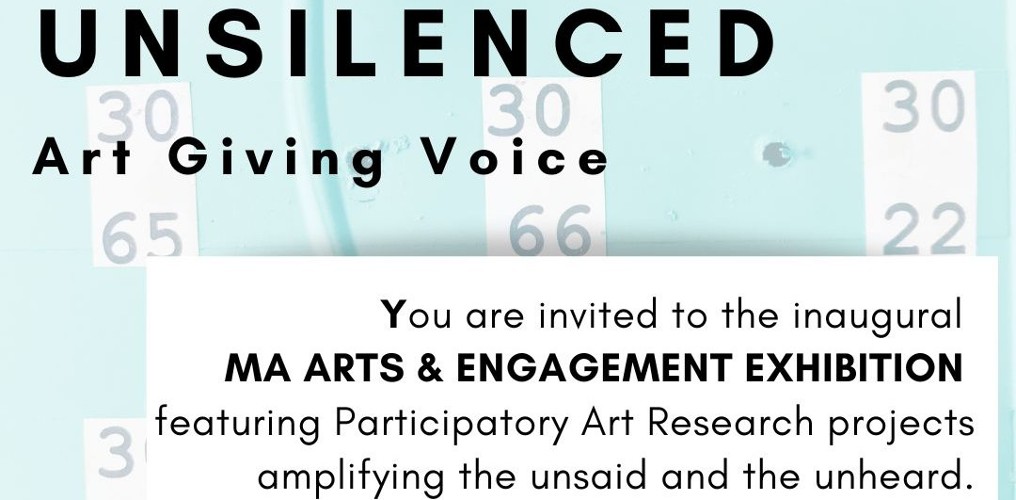UNSILENCED - MA IN ARTS AND ENGAGEMENT
10:00am - 5:00pm

UNSILENCED
MA IN ARTS AND ENGAGEMENT
(Inaugural exhibition)
OPEN 10am - 5pm MON-FRI
CONTINUES UNTIL Thursday 25 May
OPENING RECEPTION SAT 20 MAY 2pm
Research methods through arts participation forms a central role in the work of our first graduates of the new MA in Arts and Engagement programme in the Department of Arts in Health and Education, CCAD. The inaugural exhibition entitled ‘Unsilenced’ captures the applied nature of the course. The power of arts based methodologies to express the nuanced aspects of our more challenging human experiences is thoughtfully researched and carefully held. Students on this Masters programme understand the importance of allowing space for supported societal engagement and a meaningful mode of expression for research participants.
Colette Mulholland’s enquiry is around the lived experiences of older adults and the pervasive presence of technology. Colette’s research explores inherent barriers, access and exclusion and their impact on self-confidence and agency.
Kay O Donoghue asks the question: ‘Can creative engagement empower women that are experiencing the physical, psychological, and psychosocial impacts of menopause?’ Through carefully facilitated arts-based enquiries, six women mapped their experiences.
These projects deal with ubiquitous health and wellbeing concerns and position the arts in a strong position to highlight their under-representation.
About artists
Colette Mulholland is a Cork-based artist known for her dynamic and concept-driven approach to art. Her multidisciplinary practice spans across painting, sculpture, and textiles where she has been exploring socially engaged and participatory art forms. Colette is passionate about the potential of art to generate positive change and is particularly interested in the intersection of art and nature, as evidenced by her use of found and recycled materials in her work.
This research project was inspired by her own parents’ challenges with technology as they aged. The project seeks to broaden our understanding of the lived experiences of older adults around technology, exploring important themes such as barriers to digital engagement and issues of access and exclusion with a particular focus on how they impact self-confidence and agency. Through arts-based research Colette aims to explore the complex interplay between the impacts of technology and the thoughts, perceptions and values of older adults and their relationships and role in the community as factors which contribute to their self-esteem and well-being.
Colette’s unique innovative approach to art places her well in the world of socially engaged and participatory art. Her work reflects a deep commitment to exploring the human experience and using art as a means of promoting positive change in the world.
Kay O’ Donoghue is a mixed-media artist and facilitator from Co. Clare. She has a degree in Ceramics from TUS-Limerick School of Art and Design and currently works as an evening course tutor at Limerick College of Further Education teaching Mosaics. She qualified as a group facilitator in 2021 from MTU Crawford College of Art and Design and is currently completing her MA in Arts and Engagement at MTUCrawford College of Art and Design. Her passion lies in community and participatory art, enjoying the energy and dynamics that group work brings, and she is involved with various women’s sheds in the Munster region. She has recently become involved in Forest School facilitation, enjoying its approach to learning and its links to well-being and sustainability.
Her pastimes include beach foraging, creative writing, singing, music, sustainable arts and crafts, intuitive painting practices, clay work, and mindfulness. She has a background in working with children and is an experienced face painter and balloon artist.
Her current work focuses on creative engagement and asks whether it can empower women experiencing the physical, psychological, and psychosocial impacts of menopause.
Menopause: Taking Creative Control
Can creative engagement empower women that are experiencing the physical, psychological, and psychosocial impacts of menopause?
This project addresses the taboos around female pathology and particularly the peri and post-menopausal phenomena. It investigates the impacts of the stages associated with menopause on women’s physical and mental well-being and whether engagement with creative processes can foster empowerment among women who often feel powerless over their bodies, mental states, and external social perceptions and attitudes. Through arts-based inquiry, six women have documented their unique experiences of living with the life-changing and often debilitating symptoms of menopause, also known as the climacteric. Their vulnerability and ultimate courage and agency are imbued in their personal narratives and artworks and tell a story of how the creative process has empowered these brave women to continue to be unsilenced.
Climacteric: noun: a critical period or event